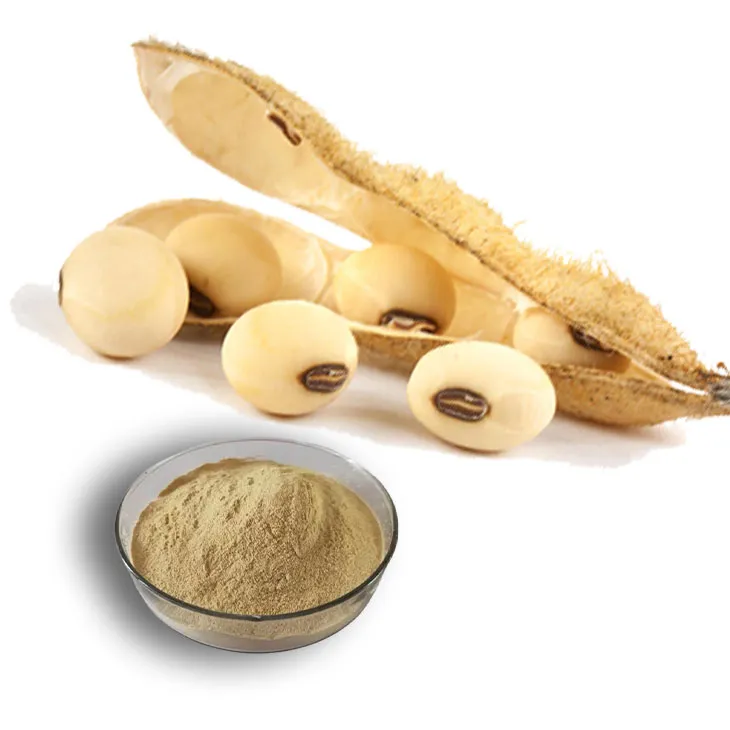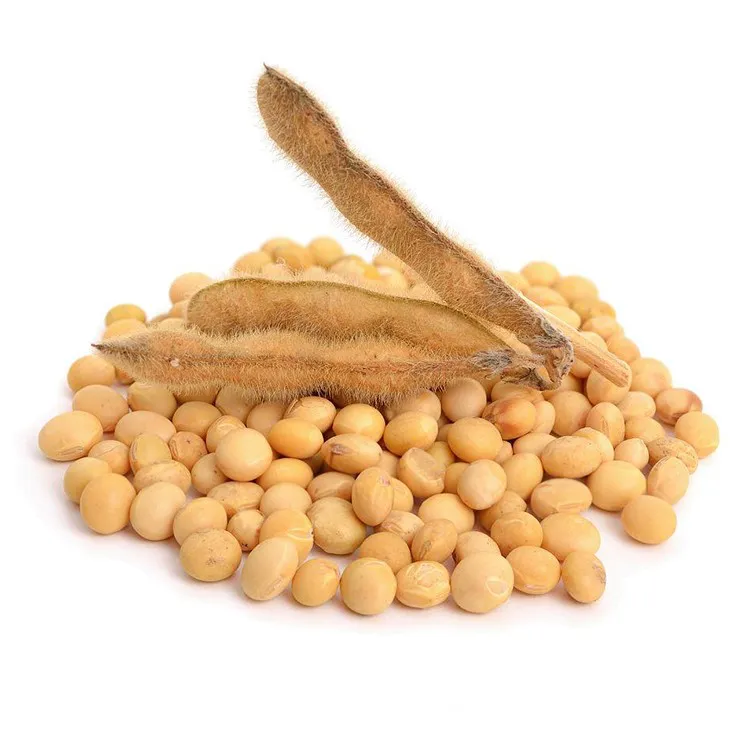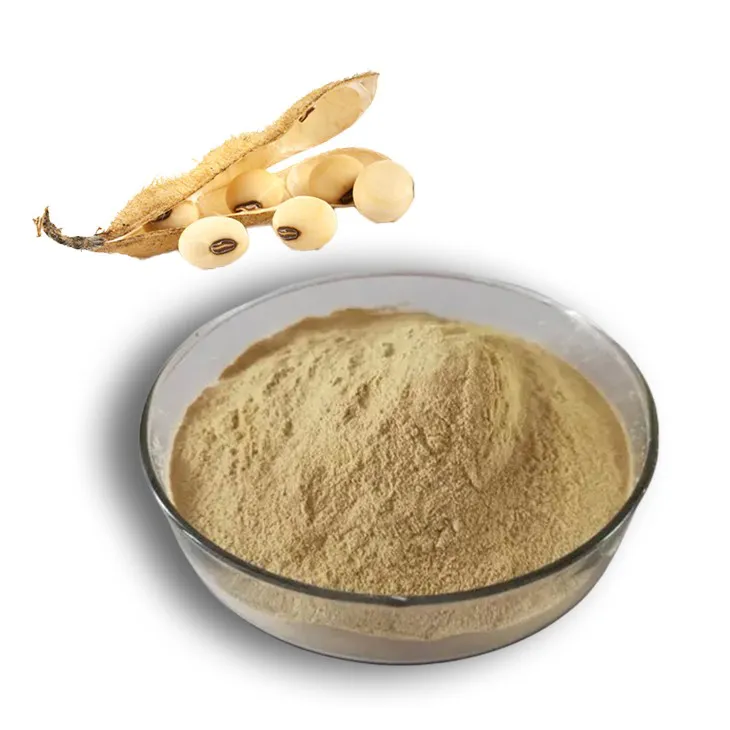- 0086-571-85302990
- sales@greenskybio.com
Can soy extract reduce cholesterol?
2024-11-12

1. Introduction
Cholesterol management is a crucial aspect of maintaining good health. High cholesterol levels are associated with an increased risk of heart disease, stroke, and other cardiovascular problems. In the search for natural ways to control cholesterol, Soy Extract has emerged as a potential candidate. Soybeans are a rich source of various nutrients and bioactive compounds, and understanding the role of Soy Extract in cholesterol reduction is of great significance.

2. Components of Soybean Extract
Soybean extract contains a diverse array of substances, each with its own potential impact on health and cholesterol levels.
2.1 Isoflavones
Isoflavones are a group of phytoestrogens found in soybeans. They are structurally similar to estrogen and can interact with estrogen receptors in the body. Genistein and daidzein are the two main isoflavones in soy. Some studies suggest that isoflavones may play a role in cholesterol reduction. They could potentially affect lipid metabolism by influencing the activity of enzymes involved in cholesterol synthesis and breakdown.
2.2 Fiber
Soybeans are also a good source of dietary fiber. The fiber in soybean extract can be classified into soluble and insoluble fiber. Soluble fiber has been shown to have a significant impact on cholesterol levels. It can form a gel - like substance in the digestive tract. This gel can bind to cholesterol and bile acids, preventing their reabsorption and promoting their excretion from the body. By reducing the amount of cholesterol that is reabsorbed, soluble fiber can help lower overall cholesterol levels in the blood.
2.3 Saponins
Saponins are another group of compounds present in soybean extract. They have surfactant - like properties, which means they can interact with lipids. Saponins may interfere with the absorption of cholesterol in the intestine. By doing so, they can potentially reduce the amount of cholesterol that enters the bloodstream.

3. Mechanisms of Cholesterol Reduction
The potential cholesterol - reducing effects of soybean extract can be attributed to several mechanisms.
3.1 Antioxidant Activity
As mentioned earlier, Soy Extract contains antioxidants. Oxidative stress is a condition in which there is an imbalance between the production of reactive oxygen species (ROS) and the body's antioxidant defenses. Oxidative stress can lead to damage of cells and tissues, and it has been linked to abnormal cholesterol levels. Antioxidants in soy extract, such as isoflavones, can scavenge free radicals and reduce oxidative stress. This, in turn, may help maintain normal cholesterol metabolism. When cells are exposed to less oxidative stress, they are more likely to function properly in terms of lipid processing, which can contribute to better cholesterol control.
3.2 Influence on Liver Function
The liver plays a central role in cholesterol metabolism. Soy extract may influence the liver's function in several ways. It could potentially regulate the expression of genes involved in cholesterol synthesis. For example, some studies suggest that isoflavones can down - regulate the genes that code for enzymes responsible for cholesterol production in the liver. Additionally, soy extract may enhance the liver's ability to take up and metabolize LDL (low - density lipoprotein) cholesterol, often referred to as "bad" cholesterol. By promoting the clearance of LDL cholesterol from the bloodstream, soy extract can help lower overall cholesterol levels.
3.3 Impact on Intestinal Absorption
The components of soy extract can also affect the absorption of cholesterol in the intestine. As mentioned, saponins can interfere with cholesterol absorption. The fiber in soy extract can also form a physical barrier in the intestine, reducing the contact between cholesterol and the intestinal wall and thereby decreasing its absorption. When less cholesterol is absorbed from the diet, the amount of cholesterol in the blood is likely to be lower.

4. Evidence from Studies
There have been numerous studies investigating the relationship between soy extract and cholesterol reduction.
4.1 Animal Studies
In animal models, many studies have shown promising results. For instance, in rats fed a high - cholesterol diet, supplementation with soy extract was associated with lower levels of total cholesterol, LDL cholesterol, and triglycerides. These effects were often attributed to the combined actions of the various components in soy extract, such as isoflavones, fiber, and saponins. Animal studies can provide valuable insights into the potential mechanisms of action, but it is important to note that the results may not always be directly translatable to humans due to differences in physiology.
4.2 Human Studies
Human studies on the cholesterol - lowering effects of soy extract have also been conducted. Some clinical trials have reported that consuming soy - based products or soy extract supplements can lead to a modest reduction in LDL cholesterol levels in humans. However, the results have not been entirely consistent across all studies. Factors such as the type and amount of soy extract used, the duration of the study, and the characteristics of the study participants (such as age, gender, and baseline cholesterol levels) can all influence the outcomes.
- For example, a study involving postmenopausal women found that those who consumed a certain amount of soy isoflavones daily for a period of time had a significant decrease in LDL cholesterol levels compared to the control group.
- On the other hand, some studies in men did not show such a clear - cut effect, suggesting that gender may play a role in the response to soy extract.
5. Limitations and Considerations
While there is evidence suggesting that soy extract may have the potential to reduce cholesterol, there are also several limitations and considerations to keep in mind.
5.1 Dosage and Formulation
The effectiveness of soy extract in reducing cholesterol may depend on the dosage and formulation. Different products may contain varying amounts of the active components, such as isoflavones. In some cases, the dosage used in studies may not be easily achievable through normal dietary intake. Additionally, the form of soy extract (e.g., tablets, powders, or extracts from different parts of the soybean) can also affect its bioavailability and ultimately its impact on cholesterol levels.
5.2 Individual Variability
People may respond differently to soy extract. Genetic factors, gut microbiota composition, and overall health status can all contribute to individual variability in the response to soy extract. Some individuals may experience a significant reduction in cholesterol levels, while others may see little or no effect. This individual variability makes it difficult to predict the exact impact of soy extract on cholesterol for a particular person.
5.3 Interaction with Medications
For those taking medications to control cholesterol, there is a potential for interaction with soy extract. For example, some medications work by inhibiting the enzyme involved in cholesterol synthesis. Soy isoflavones may also have an impact on this enzyme. Therefore, it is important for individuals taking cholesterol - lowering medications to consult their healthcare providers before starting soy extract supplementation to avoid any potential adverse effects or interference with the effectiveness of their medications.
6. Soy Extract and a Healthy Lifestyle
It is crucial to note that soy extract is not a substitute for a healthy lifestyle when it comes to cholesterol control.
6.1 Diet
A balanced diet is essential for maintaining healthy cholesterol levels. In addition to soy - based products, a diet rich in fruits, vegetables, whole grains, and lean proteins can help control cholesterol. Fruits and vegetables are rich in antioxidants, fiber, and other nutrients that can support heart health. Lean proteins, such as chicken, fish, and legumes (including soybeans), can provide the necessary amino acids without contributing excessive amounts of saturated fats, which can raise cholesterol levels.
6.2 Exercise
Regular physical activity is another key component of a healthy lifestyle for cholesterol management. Exercise can increase HDL (high - density lipoprotein) cholesterol, often referred to as "good" cholesterol, and help lower LDL cholesterol. Aerobic exercises, such as walking, running, cycling, and swimming, are particularly effective in improving lipid profiles. Resistance training can also have a positive impact on body composition and overall metabolic health, which can indirectly contribute to better cholesterol control.
6.3 Medical Management
For individuals with high cholesterol levels, proper medical management is necessary. This may include regular cholesterol screenings, and in some cases, the use of cholesterol - lowering medications. Healthcare providers can assess an individual's overall risk factors for heart disease and develop a personalized treatment plan. While soy extract may have a role to play in cholesterol management, it should be considered as part of a comprehensive approach that includes medical supervision.
7. Conclusion
In conclusion, soy extract shows potential in reducing cholesterol through multiple mechanisms, including antioxidant activity, influence on liver function, and impact on intestinal absorption. Evidence from both animal and human studies suggests that it may have a cholesterol - lowering effect, although the results are not entirely consistent. There are limitations and considerations, such as dosage, individual variability, and potential interactions with medications. Overall, soy extract can be a part of a strategy for cholesterol management, but it should be used in conjunction with a healthy lifestyle and proper medical management. Future research is needed to further clarify the optimal dosage, formulation, and long - term effects of soy extract on cholesterol levels and overall cardiovascular health.
FAQ:
What are the main substances in soy extract that may help reduce cholesterol?
The main substances in soy extract that may contribute to cholesterol reduction are antioxidants and fiber. Antioxidants can prevent oxidative stress related to abnormal cholesterol levels, and fiber can bind to cholesterol and assist in its excretion from the body.
How do antioxidants in soy extract affect cholesterol levels?
Antioxidants in soy extract prevent oxidative stress in the body. Oxidative stress is associated with abnormal cholesterol levels. By reducing oxidative stress, antioxidants may help maintain more normal cholesterol levels.
Is soy extract a reliable solution for high cholesterol on its own?
No, soy extract is not a substitute for a healthy lifestyle. While it may have some cholesterol - lowering ability, a balanced diet, regular exercise, and proper medical management are still crucial for overall cholesterol control.
How much soy extract should one consume to potentially see a cholesterol - lowering effect?
There is no one - size - fits - all answer as it can vary depending on many factors such as an individual's overall health, diet, and existing cholesterol levels. More research is needed to determine specific dosage guidelines for cholesterol reduction.
Can everyone benefit from soy extract in terms of cholesterol reduction?
Not necessarily. Individual responses to soy extract can vary. Some people may benefit from its cholesterol - lowering properties, but others may not respond in the same way due to differences in genetics, diet, and overall health.
Related literature
- The Role of Soy in Cholesterol Management"
- "Soy Extract and Cardiovascular Health: A Review of Cholesterol - Lowering Effects"
- "Antioxidants in Soy: Implications for Cholesterol Regulation"
- ▶ Hesperidin
- ▶ Citrus Bioflavonoids
- ▶ Plant Extract
- ▶ lycopene
- ▶ Diosmin
- ▶ Grape seed extract
- ▶ Sea buckthorn Juice Powder
- ▶ Fruit Juice Powder
- ▶ Hops Extract
- ▶ Artichoke Extract
- ▶ Mushroom extract
- ▶ Astaxanthin
- ▶ Green Tea Extract
- ▶ Curcumin
- ▶ Horse Chestnut Extract
- ▶ Other Product
- ▶ Boswellia Serrata Extract
- ▶ Resveratrol
- ▶ Marigold Extract
- ▶ Grape Leaf Extract
- ▶ New Product
- ▶ Aminolevulinic acid
- ▶ Cranberry Extract
- ▶ Red Yeast Rice
- ▶ Red Wine Extract
-
Panax Ginseng Leaf Extract
2024-11-12
-
Citrus Aurantii Extract
2024-11-12
-
Grapefruit Seed Extract Powder
2024-11-12
-
Marigold Extract
2024-11-12
-
Tongkat Ali Extract
2024-11-12
-
Chaste Berry Extract
2024-11-12
-
Scutellaria Extract
2024-11-12
-
Troxerutin
2024-11-12
-
Pine bark Extract Powder
2024-11-12
-
Gynostemma pentaphyllum extract
2024-11-12





















